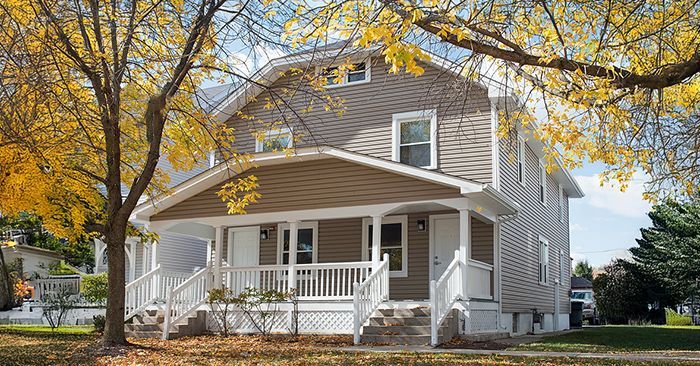Quiz: 10 Questions to See If You Will Make the Right Choices When Selling Your House

You certainly don’t have to take classes or pass an exam if you want to sell your house. All you have to do is hire a great real estate agent who had to do both of those things in order to help you sell your house quickly and for the most money possible.
Even if you took the same classes and tests your agent took to become an agent, it’d be difficult for you to know everything you need to know. Much of the insight and knowledge that makes your agent so effective at getting you the best results comes from experience actually selling houses, not from real estate school.
However, the more you know and understand about the best decisions ahead of time, the better off you’ll be. So here’s a quick quiz to help you see what decisions you’d get right, and learn from the ones you get wrong so you will be prepared to listen to the advice of your agent when the time comes.
(The answers are at the bottom…but no peeking!)
- Before listing your house, you should:
a) Renovate the kitchen and bathrooms.
b) Paint every room in the house.
c) Leave it as-is and let the buyer renovate and fix everything.
d) Speak with your real estate agent about what is worth fixing up and what is not, and doing those things. - How should you determine your listing price?
a) Use what the Zestimate says your house is worth.
b) Add 10% to what the Zestimate says.
c) Use an amount close to what your agent recommends, based upon a thorough market analysis.
d) Add up how much you owe on the mortgage, how much you spent on renovations and upgrades over the years, and how much more money you want to walk away with, and use the total of those as your listing price. - Which agent should you hire from the list below?
a) The one who had the highest suggested listing price.
b) The one who is honest with you about the value of your home, even if you threaten to list with another agent who said your house was worth more.
c) The one who has the nicest car.
d) The one who is with the biggest company in the area. - When filling out the sellers disclosure form about things you know are wrong with the house, you should:
a) Only list the things you think are obvious and that the buyer or their inspector will actually notice or figure out.
b) Don’t list any issues you may know about; it’s the inspectors job to find these things, and if they don’t find them, you’re not responsible.
c) Be honest about everything you know is or has been an issue with the house and disclose them all.
d) Have your agent fill it out for you. - When should you let buyers come see your house?
a) On Saturdays and Sundays only.
b) Only when the agent has an open house.
c) Establish a rigid set of hours on only certain days of the week that work for you, and refuse to let buyers come at a time that works best for them.
d) Whenever a buyer wants to come see your house…within reason. - If your house isn’t getting many showings or offers after being on the market for a while, you should:
a) Reduce the price.
b) Get angry with your agent and ask for more marketing.
c) Give it a fresh coat of paint.
d) Blame the market. - When buyers are coming to see the house, you should:
a) Be there to show them around the house room by room, and point out all of the upgrades and details they might miss.
b) Get the heck out of there and let the buyer and their agent have the freedom to look without you breathing down their neck.
c) Be there, just in case they have any questions, but give them space so they feel like you aren’t there. Try to stay about a room away, so you’ll be able to listen to every word they say.
d) Not be home, but make sure you have spy cams set up to see and hear them. - If you receive a low-ball offer you should:
a) Get really angry and not respond.
b) Get really angry and tell the buyer to get lost.
c) Get really angry and give the buyer a firm counter-offer and tell them they can take it or leave it, but you won’t budge any more than that.
d) Stay calm and respond with a thoughtful counter-offer and see if you can eventually get them to come up to a reasonable and acceptable amount you’re willing to accept. - If a buyer submits home inspection requests for repairs or credits, you should:
a) Tell them that those things have been like that for years, and you’ve been fine living with them like that, so you’re not willing to fix them.
b) Hire the appropriate professionals to fix every single thing the inspector noted on the report.
c) Review the buyers requests and be willing to negotiate which items will be done and which items will not be addressed.
d) Fix everything yourself, even if they should be done by a licensed contractor. - When moving out, make sure to:
a) Leave it as clean as possible and don’t leave anything behind without the buyer saying (in writing) that it’s ok for you to leave behind.
b) Leave every single paint can with leftover paint from any time the house was painted since it was originally built, just in case the buyer wants to “touch up” some areas.
c) Leave piles of trash at the curb because the garbage collectors will definitely pick it all up, no problem.
d) Wait until the last minute to pack, and expect the buyers to be okay with you coming back to get stuff once they own the house and move in.
OK, let’s see how you did on the quiz! Here are the correct answers:
- d) Speak with your real estate agent about what is worth fixing up and what is not, and doing those things. (Sometimes it makes sense to renovate or fix things in your house before listing it. But sometimes you’re better off not spending the time or money on something that won’t produce a good return on your investment, or help get your house sold. Your agent can advise you on what to do, and what not to do, in order to maximize your sale price and net profit.)
- c) Use an amount close to what your agent recommends, based upon a thorough market analysis. (Zestimates—or any other online valuation—are often inaccurate, so don’t put too much stock in any of them when pricing your house. And while the amount you owe on your house, any money you’ve invested into it, and how much you want to clear are relevant for you to consider, they do not impact how much your house is actually worth on the market. Your agent will do what is called a comparative market analysis—also known as a CMA—which compares your house to several others that are similar in size, condition, and location to determine the approximate value your house is worth.)
- b) The one who is honest with you about the value of your home, even if you threaten to list with another agent who said they’d agree to list your house for more than it’s worth. (It’s not easy for an agent to stay firm about their honest recommendation on a list price when an owner wants to hear that their house is worth more money. But it’s even harder to do so when other agents are willing to let you list it for higher than you should. Sometimes agents will agree to let a seller list it for whatever they want, in order to just get the listing, and then encourage you to lower your price after being on the market a while. Unfortunately, listing for higher than the data indicates will probably lead to you having to reduce your price…and could easily cause you to sell your house for less than the initial recommendation.)
- c) Be honest about everything you know is or has been an issue with the house and disclose them all. (Your agent can’t even coach you on what to disclose or not disclose, let alone fill the disclosure out for you. And you shouldn’t try to hide anything you know is wrong with the house, unless you enjoy the thought of being sued for failing to disclose a problem. You should be honest and disclose everything and anything you know is wrong with the house, or has been an issue that you have resolved.)
- d) Whenever a buyer wants to come see your house…within reason. (Buyers don’t only look at houses on weekends or when there’s an open house. In fact, the most motivated buyers will most likely come see your house as quickly as possible, which may be during the week. The easier you make it for buyers to come and see your house at a time that works for them and their agent, the more quickly your house will get sold, and the less time you’ll have to deal with buyers coming in and out of your house.)
- a) Reduce the price. (You will most likely see all of the current buyers in your price range come through your house within the first couple of weeks of listing. If you don’t receive an offer, or the showings have tapered off after a few weeks of being on the market, you should consider reducing the price.)
- b) Get the heck out of there and let the buyer and their agent have the freedom to look without you breathing down their neck. (Buyers and their agents need to feel free to look around and talk about what they’re thinking and feeling with each other, without the owner present…in plain sight or otherwise. They don’t need you to show them around or point things out. So make sure you’re not home, and don’t eavesdrop on your potential buyers with any sneaky tech devices.)
- d) Stay calm and respond with a thoughtful counter-offer and see if you can eventually get them to come up to a reasonable and acceptable amount you’re willing to accept. (Some buyers come in with a low-ball offer just to see if they can get a ridiculous deal. But others do it because they just think they should, or don’t know any better. If a buyer comes in with an unreasonably low offer that has no data to back it up, stay calm and negotiate with them until you get them as high as they’ll go, and you can ultimately decide to take their offer, or tell them thanks, but no thanks…)
- c) Review the buyers requests and be willing to negotiate which items will be done and which items will not be addressed. (Just because a home inspector found something and put it in the report does not mean you will have to take care of it. Inspection issues are negotiable and your agent can help you decide which things to agree to address, and which things to decline. But whatever you do agree to address should be done by a qualified or licensed professional, such as an electrician, plumber, etc.)
- a) Leave it as clean as possible and don’t leave anything behind without the buyer saying (in writing) that it’s ok for you to leave behind. (Make sure to give yourself plenty of time by packing and arranging movers well ahead of time. When it’s time to give the buyer possession, the house should be in “broom clean” condition, which is a bit subjective, but basically boils down to being clean and nothing is damaged or broken. Don’t expect the buyers to want any of your stuff you don’t feel like moving, and make sure to get their permission before leaving anything behind in the house.)
Share this post




